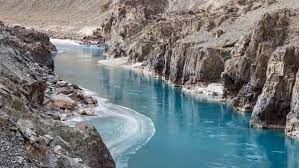Talks started between India and Pakistan on the water of rivers

Talks resumed after about two and a half years between India and Pakistan on sharing the waters of rivers. It remains to be seen whether this dialogue can reduce the tension between the two countries.
The annual meeting of the Permanent Indus Commission (PIC) for the sharing of river water has started in New Delhi. The two-day talks will continue till March 24. The last meeting of the Commission was held in Lahore on 29-30 August 2018.
According to the Indus Waters Treaty between India and Pakistan in 1960, the commission must meet at least once every year. One meeting should be held in India, the next in Pakistan, but this time the gap between the two meetings has become much longer. In 2019, the Pakistani commissioner of the commission took a team and went to the Chenab river valley for inspection and in 2020 the commission meeting could not be held due to the corona virus epidemic. In the 2021 meeting, the Indian delegation is being led by Indian Indus Commissioner Pradeep Kumar Saxena and the Pakistani team is led by Indus Commissioner Syed Mohammad Meher Ali Shah. This meeting is also being seen as a step to improve relations between the two countries.
Relationship was bad for a long time
In fact, after the last meeting, the relations between the two countries had deteriorated considerably. Both the countries were on the brink of war due to the terrorist attack in Pulwama in Jammu and Kashmir in February 2019 and 12 days later in Balakot, Pakistan by the Indian Air Force. But after a long gap, now some positive changes are visible in the situation. Just a few weeks ago, at the military level between the two countries, the Line of Control (LoC) and its adjoining areas were approved for a ceasefire and strict adherence to other agreements. Last week, Pakistan Army Chief General Qamar Bajwa said that the time has come for both the countries to forget the past and look forward. According to the Indus Waters Treaty, India has rights over all the waters of all eastern rivers (Sutlej, Beas and Ravi) and Pakistan has rights over all waters of all western rivers (Indus, Jhelum and Chenab). Apart from this, India also has the right to build hydroelectric projects on the western rivers to a limited extent. India has started work on two such new projects but Pakistan has been opposing them from the beginning. One of these is the proposed hydroelectric project at Pakal Dul on the Marusudar, a tributary of the Chenab in Kashmir’s Kishtwar district. The second is the proposed Lower Kalnai project on Chenab.




